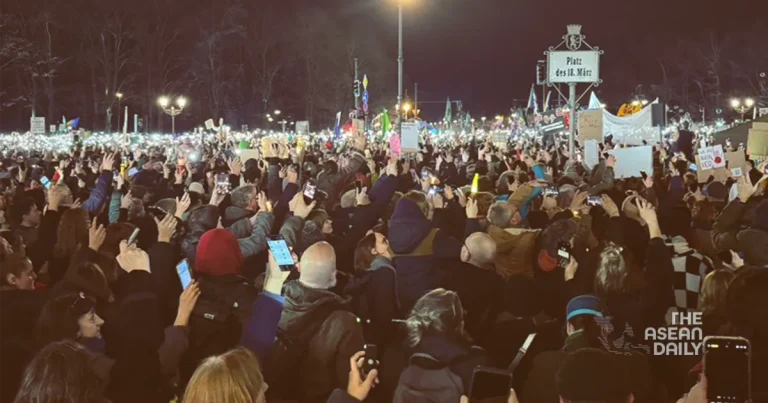26-1-2025 (BERLIN) Tens of thousands of Germans took to the streets across the nation on Saturday to protest against far-right politics, whilst controversial tech magnate Elon Musk publicly endorsed the Alternative for Germany (AfD) party ahead of next month’s crucial elections.
In Berlin, beneath the iconic Brandenburg Gate, demonstrators created a striking “sea of light” using their mobile phones, with some holding illuminated letters spelling “Resistance”. Police confirmed a turnout of 35,000 in the capital, though organisers claimed the figure reached 100,000. Cologne saw an equally impressive showing, with authorities reporting 40,000 participants.
The nationwide demonstrations, occurring across 60 towns and cities, emerged as a direct response to growing concerns about the AfD’s rising popularity. Recent polls place the far-right party at approximately 20 percent support ahead of the 23 February elections, marking unprecedented territory for post-war German politics.
Speaking via video link to AfD supporters in Halle, Musk made controversial remarks about Germany’s upcoming election, suggesting it could “decide the entire fate of Europe, maybe the fate of the world”. The tech billionaire’s endorsement came amidst recent scrutiny over his perceived alignment with far-right movements across Europe.
AfD co-leader Alice Weidel, present at the Halle rally, promoted the party’s contentious “re-migration” agenda, advocating for the removal of migrants from Germany. The party’s platform includes opposition to immigration, climate change scepticism, and criticism of gender politics.
The counter-demonstrations maintained a largely peaceful atmosphere, with protesters brandishing banners declaring “Nazis out” and “AfD is not an alternative”. However, Halle authorities reported minor incidents, leading to several criminal investigations for assault, insults, and traffic disruption.
The political tension has been further heightened by a recent knife attack in Aschaffenburg involving an Afghan migrant, which has intensified the national debate on immigration policy.
Meanwhile, the centre-right CDU/CSU alliance continues to lead polls at roughly 30 percent, with their leader Friedrich Merz positioned as the likely next chancellor. However, protesters expressed concern about potential coalition negotiations between the CDU and AfD, despite current party policy opposing such cooperation.




